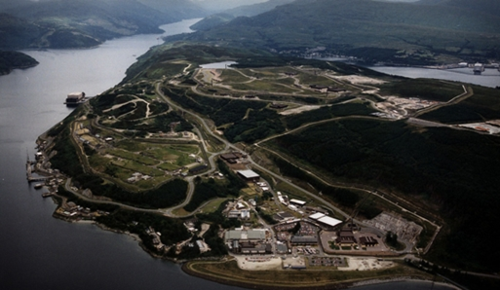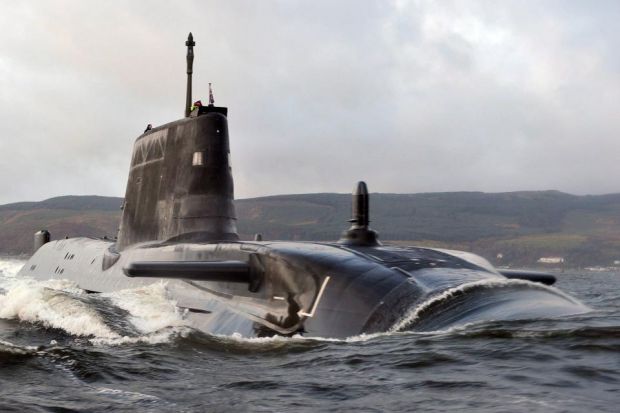Fukushima considers ‘controlled discharge’ of toxic water into ocean

Currently, 400 metric tons of highly contaminated water is being produced at the site on a daily basis. In response, TEPCO has been running a test operation of a high-tech water processing machine called ALPS, which can remove all radioactive materials from the tainted water except tritium. In line with IAEA recommendations, the utility hopes to discharge the processed water after diluting the level of tritium to legally acceptable limits.

TRITIUM – What is it and why all the fuss?
Tritium is radioactive hydrogen a product generated by nuclear power reactors. Like all radioactive substances, tritium is a carcinogen, a mutagen, and a teratogen. The radiological significance of tritium is not related to its inherent toxicity, as it is a very low energy form of radiation, but to its easy incorporation into all parts of the body that contain water.
Tritiated water can be ingested in the liquid form. It can also be inhaled or absorbed through the skin in the form of water vapour or steam, which makes tritium an occupational hazard for nuclear power plant workers.
In pregnant females, tritium ingested by the mother can cross the placenta and be incorporated directly into the foetus. Like all radioactive substances, tritium can cause cancer, genetic mutations, or developmental defects in unborn children (the latter following pre-natal exposure of the foetus). No threshold or “safe dose” of tritium has been scientifically established for any of these effects.



People in Plymouth are fighting plans to dump tritium Infant leukamia increased in the UK after Chernobyl Devonport Dockyard processes tritium from submarines
5 July 2001: Scientist raises radiation fear
A scientist has warned that radioactive materials being released in Britain are many times more dangerous than previously believed. Dr Chris Busby says he has found that low-level radiation from the Chernobyl nuclear disaster caused a sharp rise in infant leukaemia in Wales and Scotland.
His warning comes as the Environment Agency considers whether to allow Devonport Dockyard to dump TRITIUM from submarines into the River Tamar in Plymouth. Campaigners had been assured that low-level radiation would not be a health hazard – the same advice given after the Chernobyl disaster in 1986. Devonport Dockyard processes tritium from nuclear submarines.
Leukaemia rates in Plymouth were recently shown to be 25% above the national average among males and 29% above average in females. Some tritium – a weak radioactive form of hydrogen – is already released into the Tamar from the city’s historic naval dockyard.
Dr Busby says the risk of people contracting cancer from low-level radioactivity could be far greater than calculated by the Environment Agency’s advisers. He told BBC News Online: “We have sent the Environment Agency a solicitor’s letter saying they can no longer accept risk levels are safe. “So if they go into court saying they didn’t know, this letter will show they were warned.” Their model fails to predict all sort of risks. Their understanding of radiation risk is faulty.
Last month Dr Busby, from Aberystwyth, presented a paper at a World Health Organisation conference on Chernobyl in Kiev. He said the Chernobyl findings cast serious doubt on the internationally-adopted model used to calculate health risk. His paper says the increased danger comes from radiation absorbed into the body through food and drink. That makes that health risk many times greater than from external exposure. Radiation levels in the UK after Chernobyl were considered too low to have a measurable effect on health.
Dr Busby’s paper says: “Government advice was that food was safe to eat and water and milk safe to drink.” He said: “The models being used to calculate risk to health from low-level radiation are out by a factor of between 100 and 1,000. “When they apply this risk model they find hardly anybody will become ill – the figure is point-zero something. “But their model fails to predict all sort of risks.
“The whole basis of their understanding of radiation risk is faulty. Dr Busby has been advising anti-radiation campaigners who live close to the River Tamar, which divides Devon and Cornwall. They launched Cansar – Campaign Against Nuclear Storage And Radiation – when the Environment Agency announced a public consultation on Devonport Dockyard.
The operating company, has applied to increase tritium emissions by 700%. The tritium is a created in submarine reactors but cannot be dumped legally in international waters. http://news.bbc.co.uk/1/hi/health/1422130.stm

27 April 2009: Failure after failure at home of Trident fleet
Faslane has been home to the UK’s nuclear missile fleet since Polaris came into service in the mid-1960s, and is now the base for the four Trident missile submarines that replaced it. The facility, known formally as HM Naval Base Clyde, is also the base for the last remaining nuclear-powered Swiftsure hunter-killer and its replacement: four Astute class submarines.
Alongside seven Trafalgar class hunter-killers based at Devonport in Plymouth, these vessels are routinely serviced at Faslane: their nuclear reactors produce radioactive coolant that has to be replaced and need regular maintenance. That waste, which can contain radioactive tritium, cobalt-60, nickel-63, iron-55 and argon-41 gas, is handled and stored using a complex series of storage barges, tanks and pipes deep within the base.
And for nearly five decades, that process has been managed by the Ministry of Defence. That system of self-policing is now under increasing strain. Shocked by repeated safety breaches, the Scottish Environment Protection Agency (Sepa), the government authority that oversees radioactive emissions from civil nuclear sites, is pressing for the legal power to inspect and control Faslane’s nuclear operations.
The most damning report, produced by the MoD in September 2008 after complaints by Sepa, states that failing to abide by safety procedures is a “recurring theme” at Faslane. “This is a cultural issue that HM Naval Base Clyde needs to find a way to address,” it says. The 100-page report, released by Sepa to Channel 4 News, concludes that many of the ageing facilities used to process, store and dispose of radioactive waste at Faslane are not fit for purpose.
Other documents disclose that there have been at least eight radioactive leaks in the last 10 years, bringing the total number acknowledged at Faslane over the last three decades to more than 40.
The MoD admits its facilities fail to meet safety standards requiring that the “best practicable means” are used to control waste. In one case, the poor design of holding tanks has meant radioactive sludge has built up, which presents a “significant radiation hazard”. Those tanks are now going to be taken out of service.
http://www.theguardian.com/environment/2009/apr/27/nuclear-waste-scotland


16 March 2014: Nuclear bases plan to discharge more radioactive waste into the Clyde
The nuclear bomb and submarine bases at Faslane and Coulport near Helensburgh are seeking permission to increase the amount of radioactive waste they discharge into the Clyde and the air. But the Scottish Environment Protection Agency (Sepa) is coming under mounting pressure to delay giving the go-ahead to the increases until it has been given the tough new statutory powers promised by the Scottish government last week.
The Ministry of Defence (MoD) has submitted plans for the Faslane naval dockyard to pour more liquid waste into the Gareloch as the number of UK nuclear submarines based there rises from five to 14 by 2019. The waste comes from the submarines’ reactors and includes radioactive cobalt-60 and tritium.
The MoD also wants to keep emitting tritium gas to the atmosphere from the nuclear weapons stored at Coulport on Loch Long. Annual emissions of tritium have doubled between 2008 and 2012, and are expected to rise with the introduction of upgraded warhead designs.
TRITIUM: Like all radioactive substances, tritium can cause cancer, genetic mutations, or developmental defects in unborn children (the latter following pre-natal exposure of the foetus). No threshold or “safe dose” of tritium has been scientifically established for any of these effects.
Proposals to shift some submarine work to Coulport will also mean radioactive waste being transported by road between the two bases. The amount of solid waste to be treated and disposed of at Drigg near Sellafield in Cumbria is also due to increase.
The MoD stresses that all the discharges will be within authorised limits, which are being reduced. But critics say that Sepa and the Scottish government should crack down on the pollution.
In the wake of the MoD’s failure to reveal a 2012 radioactive incident at the Vulcan naval reactor in Caithness, the Scottish environment minister, Richard Lochhead, last week promised to end the MoD’s crown immunity from regulation on radioactive pollution.
“This is not the time for an informal gentleman’s agreement,” said John Ainslie, coordinator of the Scottish Campaign for Nuclear Disarmament. “After being bullied by the MoD at Vulcan, Sepa should wait until the Scottish Parliament gives them full power.”
Then they should set legally enforceable limits for discharges from Faslane, he argued. “If Scotland votes Yes, Trident and all nuclear submarines will go and the limits for nuclear discharges can then be reduced to zero.”

A Tokyo Electric Power Co. employee monitors the discharge of groundwater into the Pacific Ocean from the Fukushima No. 1 plant, in the facility’s control room
28 May 2014: Tritium levels at Fukushima Excee Pacific Ocean dumping limits
Water sampled from a well at the crippled Fukushima No. 1 nuclear plant has been found to contain levels of radioactive tritium that exceeds the limit for dumping it into the Pacific, operator Tokyo Electric Power Co. said. The discovery was the first report of over the limit tritium in groundwater at the wells since Tepco began discharging water into the ocean last week.
In samples taken from one of the 12 wells on Monday, 1,700 becquerels per liter of tritium was detected, exceeding the maximum limit of 1,500 becquerels, the utility said on Tuesday. Tritium levels in samples taken last month also topped the limit. Tepco stopped pumping water from the well on Tuesday night, and said it plans to step up groundwater monitoring.
Leave a comment